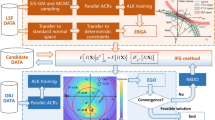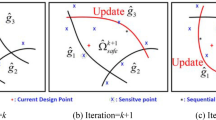Abstract
Reliability-based design optimization (RBDO) has been an important research field with the increasing demand for product reliability in practical applications. This paper presents a new RBDO method combining adaptive surrogate model and Importance Sampling-based Modified Sequential Optimization and Reliability Assessment (IS-based modified SORA) method, which aims to reduce the number of calls to the expensive objective function and constraint functions in RBDO. The proposed method consists of three key stages. First, the samples are sequentially selected to construct Kriging models with high classification accuracy for each constraint function. Second, the samples are obtained by Markov Chain Monte Carlo in the safety domain of design space. Then, another Kriging model for the objective function is sequentially constructed by adding suitable samples to update the Design of Experiment (DoE) of the objective function. Third, the expensive objective and constraint functions of the original optimization problem are replaced by the surrogate models. Then, the IS-based modified SORA method is performed to decouple reliability optimization problem into a series of deterministic optimization problems that are solved by a Genetic Algorithm. Several examples are adopted to verify the proposed method. The optimization results show that the proposed method can reduce the number of calls to the original objective function and constraint functions without loss of precision compared to the alternative methods, which illustrates the efficiency and accuracy of the proposed method.








Similar content being viewed by others
References
Rashki Mohsen, Miri Mahmoud, Moghaddam Mehdi Azhdary (2014) A simulation-based method for reliability based design optimization problems with highly nonlinear constraints. Autom Constr 47:24–36
Hamzehkolaei Naser Safaeian, Miri Mahmoud, Rashki Mohsen (2016) An enhanced simulation-based design method coupled with meta-heuristic search algorithm for accurate reliability-based design optimization. Eng Comput 32:477–495
Du X, Chen W (2004) Sequential optimization and reliability assessment method for efficient probabilistic design. J Mech Des 126(2):225–233
Zhao J, Chan AHC, Roberts C, Madelin KB (2007) Reliability evaluation and optimisation of imperfect inspections for a component with multi-defects. Reliab Eng Syst Saf 92:65–73
Songqing Shan G, Wang Gary (2008) Reliable design space and complete single-loop reliability-based design optimization. Reliab Eng Syst Saf 93:1218–1230
Yang T, Hsieh YH (2013) Reliability-based design optimization with cooperation between support vector machine and particle swarm optimization. Eng Comput 29:151–163
Pradlwarter HJ, Schuëller GI (2010) Local domain Monte Carlo simulation. Struct Saf 32:275–280
Choi SK, Grandhi RV, Canfield RA (2007) Reliability-based structural design. Springer, London
Song Shufang Lu, Zhenzhou Qiao Hongwei (2009) Subset simulation for structural reliability sensitivity analysis. Reliab Eng Syst Saf 94:658–665
Au SK, Beck J (2001) Estimation of small failure probabilities in high dimensions by subset simulation. Probab Eng Mech 16(4):263–277
Angelis MD, Patelli E, Beer M (2015) Advanced line sampling for efficient robust reliability analysis. Struct Saf 52:170–182
Chen Chyi-Tsong, Chen Mu-Ho, Horng Wei-Tze (2014) A cell evolution method for reliability-based design optimization. Appl Soft Comput 15:67–79
Zhu Ping, Shi Lei, Yang Ren-Jye, Lin Shih-Po (2015) A new sampling-based RBDO method via score function with reweighting scheme and application to vehicle designs. Appl Math Model 39:4243–4256
Rashki M, Miri M, Azhdary Moghaddam M (2012) A new efficient simulation method to approximate the probability of failure and most probable point. Struct Saf 39:22–29
Rashki M, Miri M, Azhdary Moghaddam M (2014) Closure to “A new efficient simulation method to approximate the probability of failure and most probable point”. Struct Saf 46:15–16
Okasha Nader M (2016) An improved weighted average simulation approach for solving reliability-based analysis and design optimization problems. Struct Saf 60:47–55
Hamzehkolaei Naser Safaeian, Miri Mahmoud, Rashki Mohsen (2018) New simulation-based frameworks for multi-objective reliability-based design optimization of structures. Appl Math Model 62:1–20
Du X, Chen W (2001) A most probable point-based method for efficient uncertainty analysis. J Des Manuf Autom 4(1):47–66
Hasofer AM, Lind NC (1974) Exact and invariant second-moment code format. J Eng Mech Div 100(1):111–121
Lee I, Choi KK, Du L, Gorsich D (2008) Inverse analysis method using MPP-based dimension reduction for reliability-based design optimization of nonlinear and multi-dimensional systems. Comput Methods Appl Mech Eng 198(1):14–27
Grandhi RV, Wang L (1998) Reliability-based structural optimization using improved two-point adaptive nonlinear approximations. Finite Elem Anal Des 29:35–48
Tu J, Choi KK, Park YH (1999) A new study on reliability-based design optimization. J Mech Des 121:557–564
Youn BD, Choi KK, Yang RJ, Gu L (2004) Reliability-based design optimization for crashworthiness of vehicle side impact. Struct Multidiscip Optim 26:272–283
Tsompanakis Y, Lagaros ND, Papadrakakis M (2010) Structural design optimization considering uncertainties. Taylor and Francis, London
Youn BD, Choi KK (2004) An investigation of nonlinearity of reliability-based design optimization approaches. J Mech Des 126(3):403–411
Li Xu, Gong Chunlin, Liangxian Gu, Jing Zhao, Fang Hai, Gao Ruichao (2019) A reliability-based optimization method using sequential surrogate model and Monte Carlo simulation. Struct Multidiscip Optim 59(2):439–460
Liang J, Mourelatos ZP, Nikolaidis E (2007) A single-loop approach for system reliability-based design optimization. J Mech Des 129(12):1215–1224
Cheng G, Xu L, Jiang L (2006) A sequential approximate programming strategy for reliability-based structural optimization. Comput Struct 84(21):1353–1367
Li Fan, Teresa Wu, Mengqi Hu, Dong Jin (2010) An accurate penalty-based approach for reliability-based design optimization. Res Eng Des 21:87–98
Yi P, Zhu Z, Gong J (2016) An approximate sequential optimization and reliability assessment method for reliability-based design optimization. Struct Multidiscip Optim 54:1367–1378
Ho-Huu V, Nguyen-Thoi T, Le-Anh L, Nguyen-Trang T (2016) An effective reliability-based improved constrained differential evolution for reliability-based design optimization of truss structures. Adv Eng Softw 92:48–56
Jeong Seong-Beom, Park Gyung-Jin (2017) Single loop single vector approach using the conjugate gradient in reliability based design optimization. Struct Multidiscip Optim 55:1329–1344
Chen Zhenzhong, Qiu Haobo, Gao Liang, Liu Su, Li Peigen (2013) An adaptive decoupling approach for reliability-based design optimization. Comput Struct 117:58–66
Jiang Chen, Qiu Haobo, Gao Liang, Cai Xiwen, Li Peigen (2017) An adaptive hybrid single-loop method for reliability-based design optimization using iterative control strategy. Struct Multidiscip Optim 56:1271–1286
Chen Zhenzhong, Li Xiaoke, Chen Ge, Gao Liang, Qiu Haobo, Wang Shengze (2018) A probabilistic feasible region approach for reliability-based design optimization. Struct Multidiscip Optim 57:359–372
Li Gang, Meng Zeng, Hao Hu (2015) An adaptive hybrid approach for reliability-based design optimization. Struct Multidiscip Optim 51:1051–1065
Keshtegar Behrooz (2017) A modified mean value of performance measure approach for reliability-based design optimization. Arab J Sci Eng 42:1093–1101
Keshtegar Behrooz, Hao Peng, Meng Zeng (2017) A self-adaptive modified chaos control method for reliability-based design optimization. Struct Multidiscip Optim 55:63–75
Keshtegara Behrooz, Hao Peng (2018) A hybrid descent mean value for accurate and efficient performance measure approach of reliability-based design optimization. Comput Methods Appl Mech Eng 336:237–259
Keshtegara Behrooz, Hao Peng (2018) Enhanced single-loop method for efficient reliability-based design optimization with complex constraints. Struct Multidiscip Optim 57:1731–1747
Hao Peng, Wang Yutian, Ma Rui, Liu Hongliang, Wang Bo, Li Gang (2019) A new reliability-based design optimization framework using isogeometric analysis. Comput Methods Appl Mech Eng 345:476–501
Meng Zeng, Keshtegar Behrooz (2019) Adaptive conjugate single-loop method for efficient reliability-based design and topology optimization. Comput Methods Appl Mech Eng 344:95–119
Keshtegar Behrooz, Hao Peng (2018) Enriched self-adjusted performance measure approach for reliability-based design optimization of complex engineering problems. Appl Math Model 57:37–51
Hao Peng, Ma Rui, Wang Yutian, Feng Shaowei, Wang Bo, Li Gang, Xing Hanzheng, Yang Fan (2019) An augmented step size adjustment method for the performance measure approach: toward general structural reliability-based design optimization. Struct Saf 80:32–45
Zhu Shun-Peng, Keshtegar Behrooz, Trung Nguyen-Thoi, Yaseen Zaher Mundher, Bui Dieu Tien (2019) Reliability-based structural design optimization: hybridized conjugate mean value approach. Eng Comput. https://doi.org/10.1007/s00366-019-00829-7
Chen Zhenzhong, Qiu Haobo, Gao Liang, Li Xiaoke, Li Peigen (2014) A local adaptive sampling method for reliability-based design optimization using Kriging model. Struct Multidiscip Optim 49:401–416
Chen Zhenzhong, Peng Siping, Li Xiaoke, Qiu Haobo, Xiong Huadi, Gao Liang, Li Peigen (2015) An important boundary sampling method for reliability-based design optimization using kriging model. Struct Multidiscip Optim 52:55–70
Li Xiaoke, Qiu Haobo, Chen Zhenzhong, Gao Liang, Shao Xinyu (2016) A local kriging approximation method using MPP for reliability-based design optimization. Comput Struct 162:102–115
Shi Lei, Lin Shih-Po (2016) A new RBDO method using adaptive response surface and first-order score function for crashworthiness design. Reliab Eng Syst Saf 156:125–133
Lehký D, Slowik O, Novák D (2018) Reliability-based design: artificial neural networks and double-loop reliability-based optimization approaches. Adv Eng Softw 117:123–135
Echard B, Gayton N, Lemaire M (2011) AK-MCS: an active learning reliability method combining Kriging and Monte Carlo simulation. Struct Saf 33(2):145–154
Lophaven SN, Nielsen HB, Sondergaard J (2002) DACE, a matlab Kriging toolbox, version 2.0. Technical Report. IMM-TR-2002-12; Technical University of Denmark
Lv Z, Lu Z, Wang P (2015) A new learning function for Kriging and its applications to solve reliability problems in engineering. Comput Math Appl 70:1182–1197
Sun Zhili, Wang Jian, Li Rui, Tong Cao (2017) LIF: a new Kriging learning function and its application to structural reliability analysis. Reliab Eng Syst Saf 157:152–165
Kunling Song, Zhang Yugang Yu, Xinshui Song Bifeng (2019) A new sequential surrogate method for reliability analysis and its applications in engineering. IEEE Access 7:60555–60571
Papaioannou Iason, Betz Wolfgang, Zwirglmaier Kilian, Straub Daniel (2015) MCMC algorithms for Subset Simulation. Probab Eng Mech 41:89–103
Zhao Hailong, Yue Zhufeng, Liu Yongshou, Gao Zongzhan, Zhang Yishang (2015) An efficient reliability method combining adaptive importance sampling and Kriging metamodel. Appl Math Model 39:1853–1866
Kocis L, Whiten WJ (1997) Computational investigations of low-discrepancy sequences. ACM Trans Math Softw 23(2):266–294
Keshtegar Behrooz, Chakraborty Souvik (2018) Dynamical accelerated performance measure approach for efficient reliability-based design optimization with highly nonlinear probabilistic constraints. Reliab Eng Syst Saf 178:69–83
Keshtegar Behrooz, Baharom Shahrizan, EI-Shafie Ahmed (2018) Self-adaptive conjugate method for a robust and efficient performance measure approach for reliability-based design optimization. Eng Comput 34:187–202
Acknowledgements
This study was supported in part by the Fundamental Research Funds for the Central Universities Grant No. 3102015 BJ (II) JL01 and the National Natural Science Foundation of China Grant No. 51675428.
Author information
Authors and Affiliations
Corresponding author
Additional information
Publisher's Note
Springer Nature remains neutral with regard to jurisdictional claims in published maps and institutional affiliations.
Rights and permissions
About this article
Cite this article
Song, K., Zhang, Y., Zhuang, X. et al. Reliability-based design optimization using adaptive surrogate model and importance sampling-based modified SORA method. Engineering with Computers 37, 1295–1314 (2021). https://doi.org/10.1007/s00366-019-00884-0
Received:
Accepted:
Published:
Issue Date:
DOI: https://doi.org/10.1007/s00366-019-00884-0




